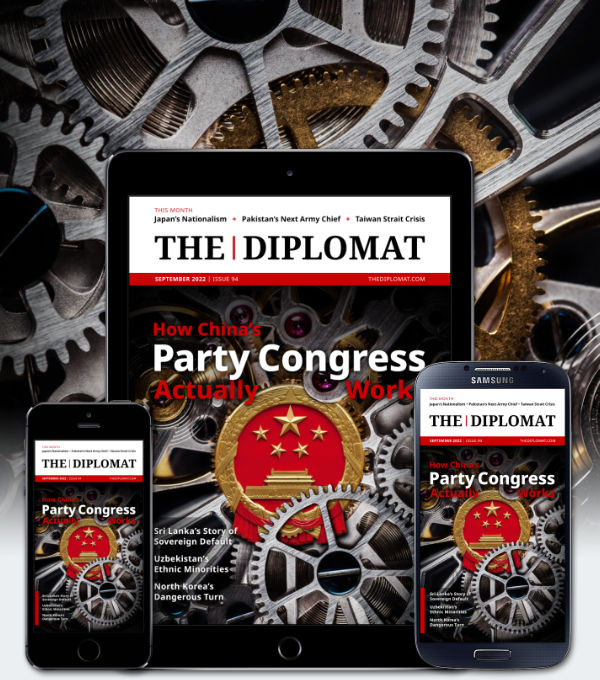| Welcome to the latest issue of Diplomat Brief. This week our top story explores Taiwan’s Achilles’ heel: energy security. We also have an interview with Stefan Aust and Adrian Geiges, authors of a new biography on Xi Jinping, about what drives China’s top leader. |
| Story of the week |  | Security Taiwan’s Greatest Vulnerability Is Its Energy SupplyWhat Happened: China’s unprecedented military drills around Taiwan in early August reinvigorated discussion about a potential blockade of the island. That highlights one of the biggest issues facing Taiwan: It is almost entirely reliant on energy supplies from abroad. Our Focus: “In 2021 Taiwan relied on imports of fossil fuels for 97.7 percent of its total energy supply,” Dr. Jeff Kucharski, a senior fellow with the Macdonald-Laurier Institute (MLI) in Ottawa, Canada, writes for The Diplomat. “… Currently stockpiles slightly exceed the minimum requirements with 39 days of coal, 146 days of oil, and 11 days of natural gas, according to the Bureau of Energy, part of Taiwan’s Ministry of Economic Affairs. Should China implement a full or even partial blockade, Taiwan would incur severe damage to its economy after 11 days.” Given how critical Taiwan is to the global economy, thanks to its near-monopoly on advanced semiconductors, Taiwan’s energy security is of concern far beyond the island’s shores. What Comes Next: “A blockade or even an increase in frequency of Chinese drills and military maneuvers in the airspace or the sea lanes around Taiwan could potentially disrupt Taiwan’s exports and delay or disrupt inbound shipments of energy,” Kucharski notes. To increase energy self-sufficiency, Taiwan will need to diversify its energy mix, including both more renewables and a potential rethink of its nuclear energy phase-out. Read this story |
| Behind the News | INTERVIEW Stefan Aust and Adrian GeigesStefan Aust and Adrian Geiges, authors of the new book “Xi Jinping: The Most Powerful Man in the World,” on the turn away from Deng-era reform and opening up: “Xi Jinping is still talking about reform and opening up, but in fact he is taking it back. He has now completely isolated China from the outside world – under the pretext of COVID-19, but mainly because it suits him politically.” Read the interview |
| This Week in Asia | Northeast Asia Xi’s Trip Abroad and China’s COVID-19 PolicyChinese President Xi Jinping is on his first trip abroad since January 2020. For many Chinese, the trip is welcome not for its foreign policy implications but for the glimmer of hope that China’s “zero-COVID” policy might be slowly receding. If that is in the cards, though, it’s still a long way away – cities from Chengdu to Yining in Xinjiang are currently stuck in lockdowns. Find out more | South Asia A Modi-Xi Summit in Samarkand?Indian Prime Minister Narendra Modi will also be in Uzbekistan for the Shanghai Cooperation Organization summit, raising speculation that he could have a sideline meeting with Xi. The odds of that happening rose sharply last week, as the two sides broke a year-long deadlock in talks and agreed to disengage their troops in the Gogra-Hotsprings area along the Line of Actual Control (LAC) in eastern Ladakh. Find out more | Southeast Asia Philippine Leader Promises ‘Different’ Drug WarPhilippine President Ferdinand Marcos Jr. said this week that he plans to soften the country’s hardline campaign against illegal drugs. In a television interview that aired on September 13, Marcos said that he had formed a working group to consider the future of his predecessor Rodrigo Duterte’s blood-soaked “war on drugs,” which has claimed more than 6,000 lives (by the government’s own count) and probably many more. At the same time, he repeated his past statements that his government has no intention of cooperating with an International Criminal Court investigation into the anti-drug campaign. Find out more | Central Asia Kazakhstan, Again, Xi’s StageAll eyes are on Chinese leader Xi Jinping’s upcoming visit to Uzbekistan to attend the SCO summit and, importantly, meet with Russian President Vladimir Putin. But first, Xi will stop in Kazakhstan’s capital. Much has changed since he last landed in Kazakhstan in 2017, from the name of the capital city to the president to the geopolitical circumstances. Xi’s visit to Nur-Sultan is important to watch closely. Find out more |
| Visualizing APAC |  | Okinawa accounts for just 0.6 percent of Japan’s land but hosts 70 percent of all U.S. military facilities in the country. See the full picture |
| Word of the Week | Society छुआछूतChhuachhut, Hindi for “untouchability,” the illegal but still widespread tradition of subjecting Dalits to social, physical, and political exclusion or violence. Find out more |
|  |




